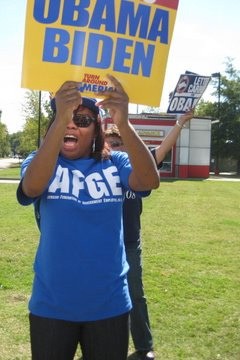 For unionists, pay freeze reminiscent of Reagan’s attack on federal workers
For unionists, pay freeze reminiscent of Reagan’s attack on federal workers
The Obama Administration, looking to bolster its deficit-cutting credentials and show its desire to take on what some label a “special interest”—organized labor—yesterday announced a two-year freeze on the wages of all federal workers. Tim Fernholz of The American Prospect points out that the pay freeze will reduce the deficit by .1% over the next ten years. Obama’s pay freeze also reinforces the notion that public employees earn exuberant salaries despite a Bureau of Labor Statistic report showing that civil servants earn 24% less than their counterparts in the private sector.
“This proposal to freeze federal pay is a superficial, panicked reaction to the deficit commission report,” stated AFGE National President John Gage, a union that represents over 600,000 federal government employees. “This pay freeze amounts to nothing more than political public relations. This is no time for scapegoating. The American people didn’t vote to stick it to a VA nursing assistant making $28,000 a year or a border patrol agent earning $34,000 per year.”

Attacking “greedy federal workers” allows Obama to claim he is taking on special interests when he is completely unwilling to take on the rich over the Employee Free Choice Act or the Bush tax cuts. But, as recent polling analysis released by the Center for American Progress indicates, labor is seen by many Americans as just another big institution too far removed from the public.
This pay freeze is in line with the president’s earlier attacks on teachers unions and lack of leadership on the EFCA. The important question we should ask is, will scoring cheap political points by scapegoating workers lead to unintended consequences that could impede economic recovery?
“Is this Obama’s PATCO?” says Campaign for America’s Future Co-Director Robert Borosage, referring to President Ronald Reagan’s mass-firing of Professional Air Traffic Controllers Organization members in 1981. “Will employers across the country use his language and his message to inflict another round of pay cuts?” A cut in wages by corporations across the board could decrease demand swinging us even further into a depression.
Regardless of the economic impact of President Obama’s pay freeze, the political impact is clear. Republicans smell blood in the water and will attempt to push The White House to make even more attacks on workers and workers will continue to wonder who is on their side. Indeed, the vote of union members appears to be at turning point. For the first time in a generation, less than 50% of union members voted Democratic. Obama’s attacks on federal workers will push them even further in the arms of right-wing, corporate-funded, populist demagogues.
“There will be no rejoicing in the homes of workers tonight,” said UE Political Action Director Chris Townsend. “But the corporate CEO’s who frequently dine at the White House will enjoy this immensely as they realize what an opportunity this president has presented them.”
*This post originally appeared in Working in These Times on November 30, 2010.
About the Author: Mike Elk is a third-generation union organizer who has worked for the United Electrical, Radio, and Machine Workers, the Campaign for America’s Future, and the Obama-Biden campaign. He has appeared as a commentator on CNN, Fox News, and NPR, and writes frequently for In These Times, Huffington Post, Alternet, and Truthout.

